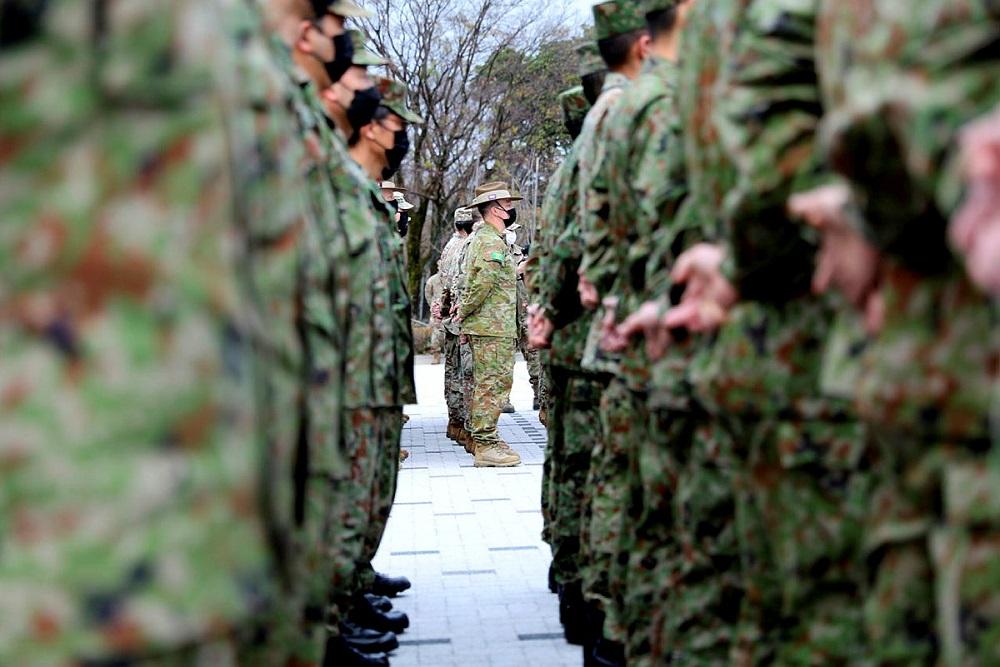Exercise Yama Sakura and how Australia’s defence of Japan is strategic
Posted By Adam E. MacAllister on September 21, 2023 @ 06:00

Australia and Japan have enjoyed a special strategic partnership since 2014, but present momentum, evident through their 2022 joint declaration on security cooperation [1] and reciprocal access agreement [2], suggests strong appreciation of threats to regional stability.
These documents don’t directly reference the source of potential threats and in their announcement, Australia’s deputy prime minister, Richard Marles, simply noted [3]: ‘Both Australia and Japan recognise the increasing complexity of our security environment and the need to grow our partnership to support a stable and prosperous region.’ But Australia’s 2023 defence strategic review [4] is more direct. It notes China’s military buildup and lack of transparency, and calls Beijing’s claims to the South China Sea a ‘threat to the global rules-based order in the Indo-Pacific’. It also argues for expanding relationships with regional partners like Japan and India, saying this would serve Australia’s interests in an increasingly contested region. Then, a 3 June 2023 communique from the United States–Japan–Australia defence ministers’ meeting [5] expressed serious concerns about the severe security environment in the East China Sea, the South China Sea and the Taiwan Strait, and over North Korea’s nuclear and missile development.
Military exercises can be designed to advance tactical, operational or strategic objectives and, in some cases, all three. To meet the often-elusive threshold of a strategic-level impact, an exercise must meaningfully influence adversary or partner decision-making, increase the capability and will of a bilateral or multilateral security relationship, and support a deliberate strategy, like regional integrated deterrence. The groundbreaking introduction of the Australian Army as a full participant in exercise Yama Sakura achieves this threshold, especially when viewed in tandem with last month’s combined naval exercises [6], the ongoing reciprocal F-35 deployments [3], and other key areas of cooperation discussed in the 10th Japan–Australia 2+2 foreign and defence ministerial [7] consultations in December 2022.
Exercise Yama Sakura [8] focuses on the defence of Japan and has been run for 42 years, 10 of which included Australian observers [9]. It supports the 1954 US and Japan Mutual Defence Assistance Agreement and has matured into one of the region’s largest and most complex exercises, involving almost 6,000 participants in 2022 [10].
Yama Sakura is important to Australia for a number of reasons.
Yama Sakura (mountain cherry blossom) is a meaningful expansion of both Australia’s bilateral security relationship with Japan and its trilateral relationship with Japan and the US. The exercise is focused on the requirements and challenges of large-scale operations in the Pacific at the theatre army, corps and division levels.
Yama Sakura’s defence of Japan scenario is useful as preparation for how Australia and its allies may choose to reinforce one another in crisis or conflict. It provides insight into the nuances of securing and regaining territory in archipelagic environments—specifically on a large scale, using joint capabilities and against a capable adversary with interior lines, greater resources and equal to or greater multi-domain capabilities.
Not discounting the importance of tactical interoperability achieved through field training exercises and exchanges, Yama Sakura focuses instead on operational-level interoperability by simulating the execution of a complex joint and multinational campaign. This teaches critical lessons to senior headquarters about effective intelligence sharing and communication, strategic force projection, contested logistics, and cross- and multi-domain effects coordination, to name just a few. Repetition matters in training, and Australia’s role in Yama Sakura builds on exercise Talisman Sabre 2023 [11], where it commanded a combined division of 11 nations.
Finally, it advances integrated deterrence in the Indo-Pacific. While militaries are not the only drivers of integrated deterrence, they are critically important to its execution. Integrated deterrence requires militaries to work with other instruments of national power, provide combat credible capabilities and prepare to operate effectively with allies and partners. The scope, scale and nature of exercise Yama Sakura directly provides adversaries and allies important perspective about the strength and will of this critical partnership.
Yama Sakura 85, to be conducted in December 2023, will provide yet another opportunity for senior military headquarters to equip themselves for the challenges of a large-scale Pacific conflict, while signalling to China and North Korea their resolve to preserve a free and open Indo-Pacific. There is a high probability that this signal will be met by a condemnatory communique suggesting that an expanded security relationship between Australia and Japan is provocative. However, post-exercise the most important message will be from Japan and Australia reinforcing the value of Yama Sakura and their ever-growing commitment to the strategic partnership.
Article printed from The Strategist: https://aspistrategist.ru
URL to article: /exercise-yama-sakura-and-australias-strategic-defence-of-japan/
URLs in this post:
[1] joint declaration on security cooperation: https://www.dfat.gov.au/countries/japan/australia-japan-joint-declaration-security-cooperation
[2] reciprocal access agreement: https://www.mofa.go.jp/files/100283786.pdf
[3] noted: https://www.minister.defence.gov.au/media-releases/2023-08-14/australia-and-japan-deepen-defence-ties
[4] defence strategic review: https://www.defence.gov.au/about/reviews-inquiries/defence-strategic-review
[5] defence ministers’ meeting: https://www.defense.gov/News/Releases/Release/Article/3415881/united-states-japan-australia-trilateral-defense-ministers-meeting-tdmm-2023-jo/
[6] naval exercises: https://asiapacificdefencereporter.com/australia-japan-and-us-join-together-for-naval-exercise/
[7] 2+2 foreign and defence ministerial: https://www.minister.defence.gov.au/statements/2022-12-10/tenth-japan-australia-22-foreign-and-defence-ministerial-consultations-joint-statement
[8] Exercise Yama Sakura: https://www.foreignminister.gov.au/minister/penny-wong/media-release/australia-and-japan-deepen-defence-ties
[9] Australian observers: https://www.defence.gov.au/news-events/news/2021-12-17/adf-strengthens-links-us-japan
[10] 6,000 participants in 2022: https://www.usarpac.army.mil/Our-Story/Our-News/Article-Display/Article/3245445/us-japan-hosts-yama-sakura-83-focuses-on-realistic-command-post-training/#:~:text=CAMP%20ASAKA%2C%20Japan%20%E2%80%93%20Approximately%205%2C700%20members%20of,Operation%20Pathways%20exercise%2C%20Nov.%2028%20to%20Dec.%2013.
[11] Talisman Sabre 2023: https://www.minister.defence.gov.au/media-releases/2023-04-16/largest-ever-exercise-talisman-sabre-be-held-australia
Click here to print.